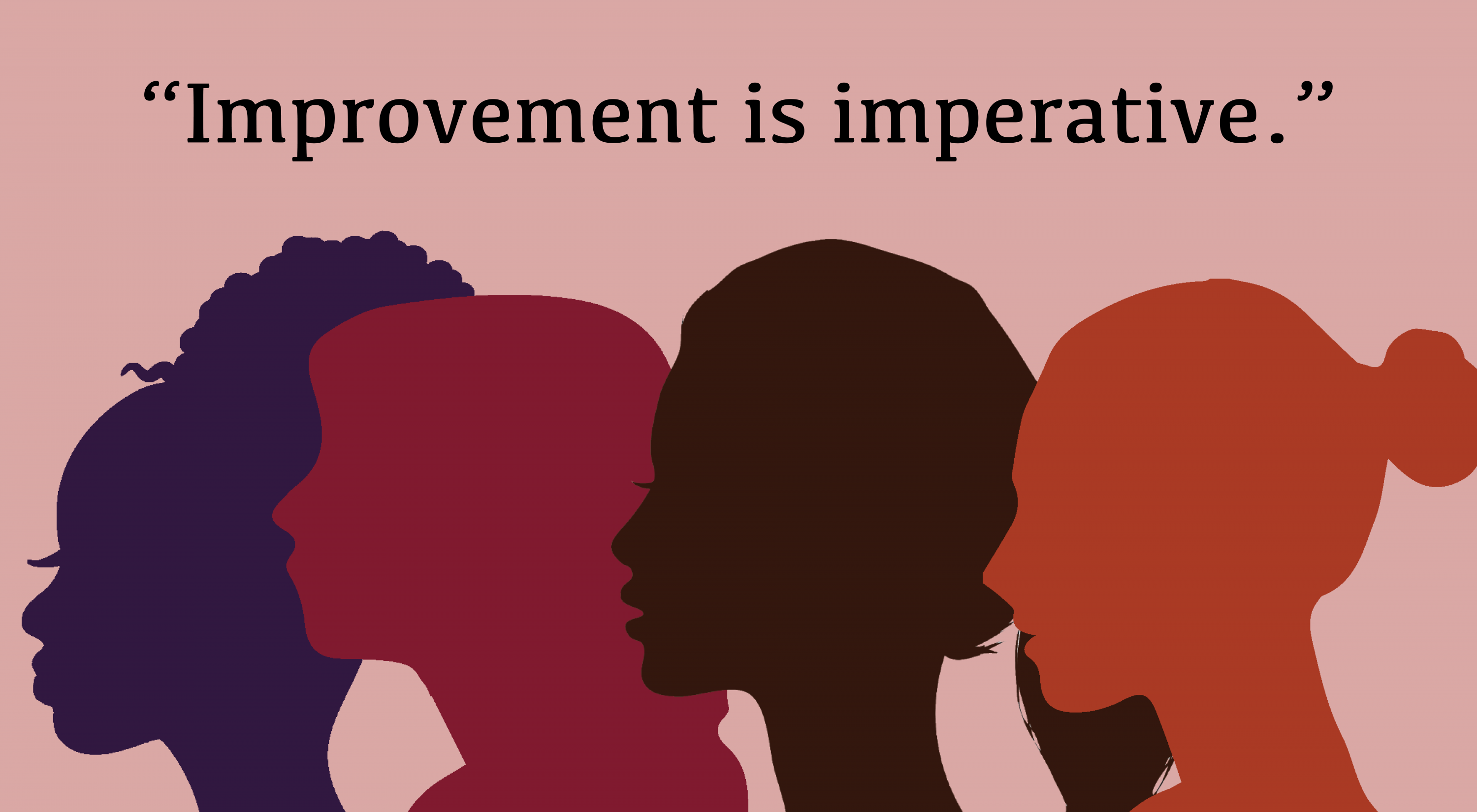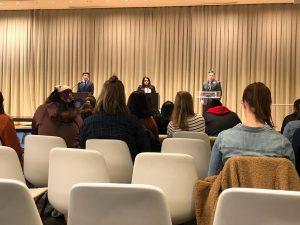Institutions at Georgetown have entered a period of reckoning. Since the outbreak of nationwide protests in response to police brutality and systemic racism, Georgetown students are questioning traditional sources of power and paying attention to how racism infiltrates aspects of campus that they previously took for granted.
This is especially true for GUSA, which has previously been critiqued for its lack of representation of women and people of color. Some have called for major reforms to make the institution more effective, while others have called for it to be abolished entirely. These calls for change were reignited days before the fall 2020 Senate election, prompting a discussion of how GUSA could better represent underserved groups, especially women of color.
The debate began when Makayla Jeffries (COL ’23) asked the class of 2023 GroupMe on Sept. 15 who was running for the upcoming GUSA Senate election from the class of 2023. Jeffries’s original messages set off a chain reaction, and soon the GroupMe was flooded with hundreds of messages about GUSA’s failure to represent the interests of marginalized groups.
In response to Jeffries’s question, other students pointed out that because then-Senator Zahra Wakilzada (COL ’23) had recently dropped out of the race, the six Senate seats representing the class of 2023 would go uncontested. Upon hearing the seats would not be contested, Jeffries asked if it would be possible for her to start a last-minute Senate campaign.
Members of GUSA informed her that, according to GUSA rules, students who did not originally file to run must file a petition with at least 50 student signatures before the end of a set petition period to be put on the ballot. By the time Jeffries sent her message, it was too late for her or anyone else to run, then only two days before polls opened. Additionally, students could not write-in candidates because the online election platform was not set up to handle it, preventing her from launching a write-in campaign.
Jeffries’s inability to get on the ballot prompted outcry from members of the class of 2023 GroupMe. Some expressed a desire for more progressive candidates across the ballot, while others argued it was disingenuous for GUSA to claim to represent students while not listening to student demands for better representation within the Senate.
These discussions prompted some students, including Wakilzada, to call for an extension of the petition period to allow students to be added to the ballot. At an emergency meeting on Sept. 16, the GUSA Senate passed a motion to extend the petition period by 16 hours, allowing several new candidates to petition, including Jeffries.
In addition to advocating for an extension to the petition period, several students began to raise concerns about the environment of the Senate itself.
In response to a comment that GUSA is supposed to represent student interests, Wakilzada said in her experience, many individuals in GUSA are not interested in advocating for members of the student body. “The majority of individuals in GUSA love the ‘power’ they hold,” she wrote in the GroupMe, “which creates a very unnecessary toxic environment where they forget that they were elected to work for the students.”
Wakilzada and Jeffries, both women of color, also sent messages about the mistreatment they had faced from members of the GUSA Senate. Wakilzada cited such treatment as a primary factor in her decision to drop out, whereas Jeffries cited it as a reason she decided not to run in the first place.
“Now y’all know EXACTLY why WOC [women of color] (including me) resign,” Wakilzada’s message read.
Following the criticisms of GUSA and the extension of the petition period, several students started advocating for more progressive candidates to file petitions. Some argued these candidates would ensure GUSA more effectively represented the interests of marginalized voices, fixing the problems of what Wakilzada referred to as a “toxic” environment and “performative” advocacy.
Wakilzada and Sen. Leo Teixeira (COL ’21) collaborated to create a coalition of 27 candidates on the ballot whose election would garner a progressive majority in the Senate. Several sitting senators dropped out of their reelection races, paving the way for the coalition to pick up 19 of the 29 possible seats, a clear majority.
Despite the ostensible victory of progressive candidates on election day, many of the original criticisms of the Senate remained unaddressed after the results were announced. Since the election, the Voice has spoken to several women of color within GUSA about their perspective on the issues with the Senate and how the new class of senators might be capable of fixing them.
***
Eliza Lafferty (COL ’21) is the GUSA student representative to the University Board of Directors and a former speaker of the GUSA Senate. Lafferty recalled that when she was elected as a senator in her first and second years at Georgetown, she was one of the only women of color in the Senate.
“There were people who were in their fourth year, mostly white guys, in a very intimidating space,” she said. “I put a lot of work in to manifest that space, claim it as one I was ready to learn from.”
Lafferty explained that due to a combination of her age, race, and gender, her peers consistently spoke over her and would not allow her to exercise authority as speaker, even though they had elected her to the position. “There were certain ways people interacted with me,” she said. “My identity is like a lens I see the world through, and so it was something that was very perceivable.”
Campus publications referred to her as the vice speaker instead of the speaker; other senators would send legislation to the vice speaker, who was a white man, instead of her; people would not allow her to speak during meetings she was supposed to be running. Lafferty said the lack of respect she felt in the Senate was constant.
“Being a woman of color in power, there is all of this noise around us, saying we don’t look like what power should look like,” she said.
She emphasized that her peers’ presumption that she was unqualified led her to outwork them.
“That really drove me to do the absolute best job I could, to stay up late, do all the work so that no one could question my authority or my space,” Lafferty said. “If you’re a woman, you have to work twice as hard. If you’re a woman of color, that adds to it.”
Such testimonies are widespread among women and non-binary people of color in GUSA, some of whom have resigned before the end of their terms due to the environment the Senate creates. For example, Alexandra Mucher, a former senator, resigned from the Senate in January due to GUSA’s inability to support Black women and non-binary survivors of sexual assault. Mucher no longer attends Georgetown. Daniella Sanchez (COL ‘22), who served as the speaker of the GUSA Senate over the summer, resigned on Sept. 28, citing concerns in her resignation email that the Senate environment posed a detriment to her well-being.
Sanchez also reported her perspective was not valued and that her leadership was not respected. “I was constantly having to further explain myself and my actions, more than men or other people had to because I was a woman of color,” she said.
When Sanchez was first elected, she was one of the only women from her class running, and she says many of her peers in the Senate claimed she only won because people felt bad there were not enough women in the Senate. Additionally, she said it took longer for the speaker at the time to recognize her voice than it did to give similar recognition to white women and men of color in the Senate.
“When I was in a leadership role as the Policy and Advocacy Committee chair, there were certain senators who did not care to give me the respect I deserved as their chair,” Sanchez added. “Some would vape during our meetings or would come in with their headphones on.”
However, she also feels institutional barriers in the Senate prevent senators from making their advocacy efforts as effective as they could be. These barriers perpetuate inequalities present both in the Senate and the broader Georgetown community: They simultaneously disempower women of color and prevent senators from advocating for marginalized students.
For instance, Sanchez criticized the bylaws and other procedures the Senate is required to follow as creating high barriers to participation in the Senate, allowing voices familiar with the rules to dominate the conversation.
“You can manipulate Robert’s Rules to get what you want done and block others from doing what they want to do,” she said. For example, someone can make several motions in succession to confuse other senators about what they are voting on and what is happening.
Sanchez believes the process for passing legislation goes through so much bureaucracy that it hinders effective action. “It allows so much internalization of that legislation, that project, that initiative that it’s difficult to act quickly,” she said. “Instead of having advocates come to help us in an easy, accessible manner, they have to put in a lot of time and effort that is unnecessary.”
Jeffries had similar criticisms of the Senate’s approach to advocacy in her experience. “We should make GUSA accessible. No one knows what happens in GUSA unless you are in GUSA,” she said. “I think GUSA needs to do a better job reaching out to marginalized communities.”
GUSA’s inaccessibility and lack of outreach to marginalized communities discourages students with connections to such communities from running in the first place, Jeffries argued. “There was never an active role to facilitate relationships within communities,” she said.
Jeffries also said senators often do not effectively advocate for the communities they claim to serve, especially communities of color.
“There are a lot of experiences at Georgetown where there are a lot of people who haven’t been around Black people or want to be held as an advocate when they aren’t necessarily,” she said. “It was especially odd to me when, outside of Zahra, I did not see a lot of GUSA senators at the sit-in we had for the Black Survivors Coalition,” referring to a February sit-in in President John DeGioia’s office to advocate for a series of demands to better meet Black women and non-binary survivors’ needs.
“When people didn’t come to the sit-in and people still had an outward mentality that they were advocates and were all for activism, it made me upset,” she added.
Wakilzada also criticized what she saw as performative activism on the part of GUSA senators.
“There is a culture of campaigning where people point out stuff like GSP [Georgetown Scholars’ Program], first-generation students, low-income students, people of color, inclusivity, survivors, accessibility, mental health, and when they get elected, they don’t do any work,” she said.
“People’s campaigns would be like, ‘we need to create an inclusive Senate,’ and then those are the same people who put down those groups of people and have also discouraged those people from running for leadership positions.”
Wakilzada reported feeling like the Senate consistently downplayed or ignored the experiences of people from marginalized groups. “The reason for my dropout in the reelection race was the toxicity in the Senate in general and the barriers I faced when I wanted to solve those issues,” she said. “When a senator would talk about their experiences, there was this motivation for some people to just say, ‘no, you’re not right.’”
Of the four women the Voice spoke to—Jeffries, Lafferty, Sanchez, and Wakilzada—only Jeffries is a sitting senator. That said, all four remain hopeful that the Senate can move beyond its toxicity and ineffectiveness.
Despite her negative experiences, Lafferty is far from believing the Senate is irredeemable. “I think what’s been really wonderful to see is the way the Senate has evolved,” she said. “The Senate can be a very good space. I just want to emphasize that representation matters, and it means a lot to see someone who looks like you in those spaces.”
Sanchez similarly believes in the potential of the Senate as a vehicle for effective advocacy, particularly considering the new makeup of the 15th Senate. The new Senate is majority-women and has many more people of color represented that it did in previous terms. “I have so much faith that they will be able to change the tide in the Senate, especially given the number of women and women of color elected to leadership positions,” Sanchez said.
Wakilzada agreed, citing the importance of having senators who are not only women of color, but who are also LGBTQ+, low-income, immigrants, or first-generation students.
“We’ve gotten people with intersectional identities elected, and they will be the ones who bring up their experiences,” she said. “They actually know, when they petition, what they are fighting for, so they are going to make a difference.”
Having students who come from activist backgrounds is also an extremely important facet of the new Senate, Jeffries said. “This new Senate has relationships to communities that would benefit from being able to use GUSA as a tool,” she said. “There are people already involved in this work now in GUSA.”
Jeffries pointed out the importance of having senators involved in groups such as the Black Leadership Forum, the Latinx Leadership Forum, Georgetown United Against Police Aggression, and H*yas for Choice. Backgrounds in advocacy are important in predicting whether people in the Senate will advocate for people with similar experiences, she argued.
“People in the Senate, like me, are already deeply involved in doing work that benefits our communities,” she said. “So hopefully we don’t have to stretch as much to create those relationships.”
The new Senate might finally make major strides in changing the toxicity of GUSA’s work environment due to the critical mass of senators committed to inclusivity, Sanchez added. “They are going to implement their experiences and implement the recognition that marginalized communities deserve,” she said. “I think that they’re going to change the toxicity of what we saw with women and marginalized communities before.”
***
Since the election, the new Senate has had four meetings, two of which primarily involved administrative business, such as leadership elections and filling vacancies. Though it is too early to tell whether the new Senate is meaningfully addressing issues related to diversity and inclusivity, Teixeira, the new speaker, committed to creating a progressive environment in a statement on Sept. 30.
“The first step is that this senate will inherently be a comfortable and progressive space on these issues by sheer nature of the amount of diversity and representation that these elections have brought to this body,” he wrote. Teixeira also committed to monitoring the Senate’s internal climate and implementing trainings regarding “sensitivity issues.”
“We fully predict this Senate doing unimaginably better than last term on these matters,” Teixeira wrote.
Improvement is imperative, Wakilzada says, because otherwise the Senate will continue to fail women of color and other marginalized groups.
“If you don’t have the people of color and marginalized groups respected on the table, then how can you advocate for those people?” she asked.“If there are not people there to talk about their experiences and say what their community needs, then I don’t see how somebody can advocate for them.”






